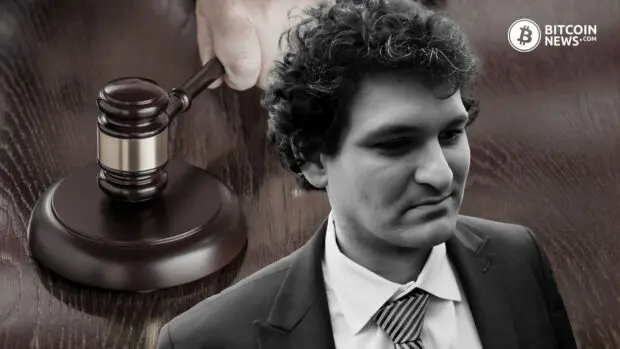In a landmark case that has rocked the digital asset world, Sam Bankman-Fried, the founder of FTX, faces the possibility of spending up to 50 years behind bars for orchestrating what prosecutors describe as “one of the largest financial frauds in history.” As many await Sam Bankman Fried sentencing, US prosecutors assert that 50 years jail time aligns with the severity of his crimes.
Bankman-Fried’s lawyers deemed a potential 110-year prison term “grotesque” during his trial for alleged crimes. In November 2022, he lost all his wealth as FTX went bankrupt due to a surge in customers pulling out their funds.
The Allegations: Massive Fraud and Deception
Bankman-Fried, once hailed as a rising star in the digital asset industry, stands accused of masterminding a scheme that saw billions of dollars vanish from the accounts of FTX customers and investors. According to prosecutors, Bankman-Fried’s actions led to losses exceeding $8 billion, affecting thousands of individuals worldwide.
Prosecutors paint a damning picture of Bankman-Fried’s conduct, citing his “unmatched greed and hubris” as key factors driving the fraudulent activities. Despite his conviction on seven counts of fraud and conspiracy, Bankman-Fried has shown no remorse, with prosecutors noting:
“His life in recent years has been one of unmatched greed and hubris; of ambition and rationalization; and courting risk and gambling repeatedly with other people’s money, and even now Bankman-Fried refuses to admit what he did was wrong.”
Prosecutors depict Sam Bankman-Fried as a driven individual with grand ambitions, quoting, “Having set himself on the goal of amassing endless wealth and unlimited power — to the point that he thought he might become President and the world’s first trillionaire — there was little Bankman-Fried did not do to achieve it.” They characterized the case as one of deceit and exploitation, stating, “This case has always been about lying, cheating, and stealing and we have no patience for it.”
They accused Bankman-Fried of disregarding societal norms and engaging in illegal activities fueled by his own sense of superiority, noting:
“He knew what society deemed illegal and unethical, but disregarded that based on a pernicious megalomania guided by the defendant’s own values and sense of superiority.”
Furthermore, they alleged that he victimized numerous individuals and entities over several years through various means such as stealing money, lying to investors, and illegal political contributions. The prosecutors claimed that Bankman-Fried continued to evade responsibility even after his arrest, attempting to tamper with witnesses and lying under oath.
Related reading: Singh on FTX’s Missing $8B: Staggering Celebrity and Political Donations
They emphasized the potential danger of releasing him back into society, citing his history and stating, “a significant likelihood that if the defendant is released back into society at a young enough age he will have the opportunity to engage in another fraud.” They pointed to his post-bankruptcy musings about launching another exchange, suggesting a pattern of behavior.
A Fall from Grace: From Billionaire to Defendant
The rise and fall of Sam Bankman-Fried represent a cautionary tale within the digital assets realm. Once celebrated for his entrepreneurial prowess and philanthropic endeavors, Bankman-Fried’s reputation now lies in tatters following the collapse of FTX and the subsequent revelations of financial misconduct.
FTX, which at its peak boasted a valuation of $32 billion, was propelled into the mainstream through high-profile marketing campaigns featuring celebrities like Tom Brady and Larry David. However, behind the glitz and glamour, prosecutors allege a darker reality characterized by deception and misappropriation of funds.
Sam Bankman Fried Sentencing
As the legal battle unfolds, prosecutors and defense attorneys present starkly contrasting arguments regarding the appropriate punishment for Bankman-Fried’s crimes.
Prosecutors are adamant in their call for a severe sentence, seeking up to 50 years in prison to reflect the gravity of the offenses committed. They emphasize the devastating impact of Bankman-Fried’s actions on victims, highlighting the sense of “dread and despair” experienced by those who entrusted their savings to FTX.
Bankman-Fried’s legal team however, made their case in a document submitted before sentencing:
“Sam is a 31-year-old, first-time, non-violent offender, who was joined in the conduct at issue by at least four other culpable individuals, in a matter where victims are poised to recover – were always poised to recover – a hundred cents on the dollar,”
Bankman-Fried’s defense team appeals for leniency, advocating for a maximum sentence of six-and-a-half years. They portray their client as a young man with a commitment to philanthropy, arguing against the imposition of a “grotesque” and “barbaric” 100-year term recommended by probation officers.
Marc Mukasey, the attorney representing the former billionaire, stated to U.S. District Judge Lewis Kaplan that a sentence ranging from 5-1/4 to 6-1/2 years in prison would be fitting. Since August, he’s been imprisoned at Brooklyn’s Metropolitan Detention Center after his bail was revoked by Kaplan for probable witness tampering.
The Road Ahead: Appeals and Future Implications
As the sentencing hearing looms on March 28, the outcome of Bankman-Fried’s case carries significant implications for the broader digital asset industry and beyond. The verdict will not only serve as a measure of accountability for those involved but also shape perceptions of regulatory oversight within the digital asset space.
Despite the uncertainty surrounding his fate, Bankman-Fried remains determined to appeal against the verdict. His legal team contends that the allegations against him, including claims of bribery and unlawful political donations, warrant further examination beyond the confines of the initial trial.
The prosecution of Sam Bankman-Fried represents a pivotal moment in the evolution of digital assets regulation. As authorities strive to uphold the rule of law in the face of emerging financial technologies, the outcome of this case will reverberate throughout the industry, underscoring the importance of transparency and accountability in the digital age.










